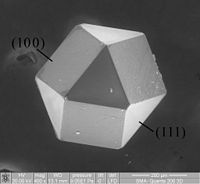
Photo from wikipedia
We present materials informatics approach to search for superconducting hydrogen compounds, which is based on a genetic algorithm and a genetic programming. This method consists of four stages: (i) search… Click to show full abstract
We present materials informatics approach to search for superconducting hydrogen compounds, which is based on a genetic algorithm and a genetic programming. This method consists of four stages: (i) search for stable crystal structures of materials by a genetic algorithm, (ii) collection of physical and chemical property data by first-principles calculations, (iii) development of superconductivity predictor based on the database by a genetic programming, and (iv) discovery of potential candidates by regression analysis. By repeatedly performing the process as (i) $\rightarrow$ (ii) $\rightarrow$ (iii) $\rightarrow$ (iv) $\rightarrow$ (i) $\rightarrow$ $\dots$, the superconductivity of the discovered candidates is validated by first-principles calculations, and the database and predictor are further improved, which leads to an efficient search for superconducting materials. We applied this method to hypothetical ternary hydrogen compounds and predicted KScH$_{12}$ with a modulated hydrogen cage showing the superconducting critical temperature of 122 K at 300 GPa and GaAsH$_{6}$ showing 98 K at 180 GPa.
Journal Title: Physical Review B
Year Published: 2019
Link to full text (if available)
Share on Social Media: Sign Up to like & get
recommendations!